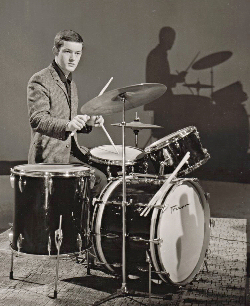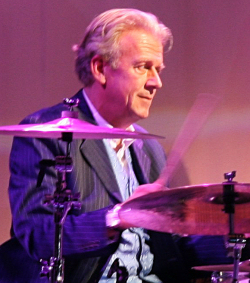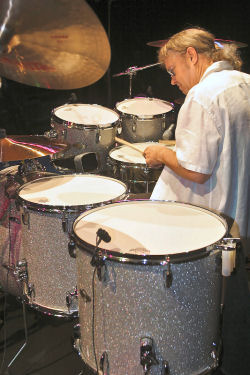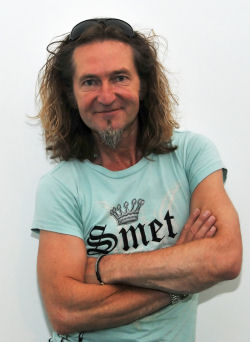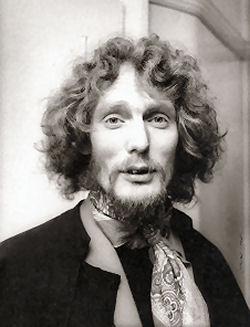After we interviewed Stiff Little Fingers drummer Steve Grantley a while back we asked him if there were any British Drum Icons that he felt had been overlooked. There were many including, Mickey Tucker from Sweet, Ian Dury’s drummer Charles Charles and Neil Conti from Prefab Sprout but he also listed his predecessor in SLF Dolphin Taylor. The two have been friends for many years so we asked Steve if he would interview Mr. Taylor for us. He duly agreed.
We’ll let Steve take over here…
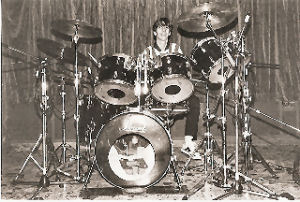
Dolphin back then…
I realise that many of the younger readers out there may not be too familiar with the name Dolphin Taylor. So, I felt I needed to put Dolphin’s talent as a sticksman into some kind of perspective. I personally know how good he is because when I joined Stiff Little Fingers I had to recreate many of his parts – his were tough shoes to fill.
Dolphin Taylor first came to prominence in 1977 as drummer with the Tom Robinson Band (TRB). They were bundled in with the nihilist punk rock crowd but were musically more refined than many of their contemporaries. They stood apart from the plethora of ‘Anarchy’ bands largely because Tom, the articulate singer and bass player wrote songs with a deep social conscience that were anti-racist and pro individual freedom.
The TRB’s first single 2468 Motorway reached No 5 on the UK chart and their debut album Power In The Darkness went ‘Gold’ in the UK reaching No 4. London’s Capital Radio listeners voted them both ‘Best New Band’ and ‘Best London Band’ and they swiftly became the UK’s music press darlings. 1977 was very much their year but the success was short lived and Dolphin left the group during the recording of their second album in 1978 but he, Topper Headon of The Clash and Dave Ruffy of The Ruts were undoubtedly the best players of the punk rock crop.
But how does a young lad from Cowley in Middlesex with a Keith Moon fixation go from being an aspiring drummer to the CEO of his own multi-million dollar music company. I decided to find out the twist and turns of Dolphins career and see what makes this unsung British drum hero tick.
Lets start right at the beginning Dolph. Where were you born and raised?
I was born at my parent’s house in Cowley Middlesex and spent my formative years living in West Drayton – near Heathrow Airport. Schooling was in Hillingdon and hanging around in Uxbridge. My local gig was Brunel University.
What attracted you to the drums?
It wasn’t exactly an attraction more a parental maneuver whereby the recently purchased drum kit for my rhythmically challenged brother should be inherited by the next eligible sibling. Me!
When did you first start playing?
I was 5 years old. My first teacher was a horribly spotted oik – I think he fancied my sister – I hated him with a vengeance. He taught me some seemingly nonsensical techniques that revolved exclusively around something mysteriously named ‘rudiments’ and used really alien words like triplets , paradiddles and dotted minims. He made me endlessly practice 5,7,and 13 stroke rolls on a plastic place mat that my dad had glued to a bit of wood he found in the shed.
I reckon this torture probably lasted for about four years until the teacher finally threw in the towel. He was being paid about 5 shillings a lesson, – 25p in new money, it was 1963 – and I think the mental pressure of dealing with my disgust, fear and absolute stubbornness wore him down. Also, my sister’s libido for which he seriously pined had long been achieved by another.
My parents found me a new teacher. He was really cool; he had sideburns and a shed at the bottom of his garden with not only a kit but a record player as well! He put me in the shed, cued up Bread and Butter by the Newbeats, told me to ‘jam’ to it and went back to his house for his tea. I think he was called Pete. He was a revelation!
Who were your influences in the early days?
Ringo . . . of course – hey I was 5! Later Cozy Powell and ultimately the one and only Keith Moon. Carl Palmer for a while and a bit of Ginger Baker. In a magazine poll of the year’s best drummers I once came 18th out of 20, one place in front of Carl Palmer, two behind Rat Scabies. I admired but never really aspired to be Aynsley Dunbar, I recognised that Vinnie (Colaiuta) and Steve Gadd were drum gods, while always acknowledging that being a good drummer was almost akin to being a good dustman, because you get about the same amount of appreciation from the lead singer! Some don’t even give you a Christmas bonus!
Locking in with your fellow musicians is a bit like cruising in a very expensive car along a brand new road surface; smooth, cool and completely in control of the power
How old were you when you got your first ‘proper’ drum kit and what was it?
I got it at age 5. I did my first gig aged 7. I honestly can’t remember what make it was – it might have been a ‘Carlton’ but I can’t guarantee that. It was ice blue mother of pearl and it had a kick, rack & floor tom and one cymbal. Some years later when I got my 5 piece Premier kit which had wood shells. I covered all the drums with white Fablon and had the mother of all kits – 2 kicks, 3 racks and 2 floors – and by now I’d got quite a few cymbals. At gigs it would take me an hour to set it up and another hour to break it down. I soon got bored with that!
How did you develop your own style and sense of time?
Learning the drums for me at such an early age was a bit like teaching a child another language – it seemed completely natural. I never played a tune the same way twice, a theme that continued for my entire career. I just expressed and interpreted with a little care but not much attention.
What advice do you have for younger players to help them develop their sense of time?
First off, don’t be paranoid about it! If you think too much about anything then you’re thinking too much. When I first discovered the true meaning of the phrase ‘in the pocket’ it was an incredibly enlightening sensation. Locking in with your fellow musicians is a bit like cruising in a very expensive car along a brand new road surface; smooth, cool and completely in control of the power. But you have to ‘feel it’. I know that’s sounds a bit ‘Luke! Use the force!’ but I truly believe it. Straight rhythm playing should not cause a problem, but fills can. Keep your fills uncomplicated at first, make sure you use your kick or hat to keep you locked in during the fills and don’t get too excited when one’s coming up. Play to medium tempo recordings and practice to click tracks.
What was your first ‘paid’ gig?
With the Bonnachords, my sister Chris’s accordion band, we played old folks homes. At the end of the set my presence was regularly requested by ancient female members of the audience. They would press a shilling into my hand as they forced a mustachioed kiss upon my face. I’m not sure if this counts as groupies, prostitution or a paid gig. My experienced in latter years has taught me that there is probably little difference.
What was your first professional group called and what did you play?
My first pro group was a cabaret act called Dragon’s Playground whose claim to fame was to be being beaten by a dog act on a TV show called New Faces, a ‘70’s equivalent to Britain’s Got Talent. Before I joined they had a flute player who is now known to the world as Annie Lennox. Dragon’s Playground paid me 20 pounds a week and you know what? I walked around at 16 years old and was well made up that I could call myself a ‘professional musician’.
How did you get the job in the Tom Robinson Band?
The now defunct Dragon’s Playground bass player answered a Melody Maker add. I drove him to the audition in a flat above Ronnie Scotts Jazz club. Tom hadn’t yet advertised for a drummer so I talked my way into an audition and after that he gave me a months ‘trial’. Tom played the song Up Against The Wall on an acoustic guitar and it was the most powerful thing I had ever heard. I grew to love the Sex Pistols and The Clash but this was my introduction to Punk Music.
What drums and cymbals were you using at the time?
I still had the remnants of the old Premier but as soon as we signed a deal I went out and bought this ridiculous Tama kit with about 8 toms. I had a roadie – sorry, drum tech – by now! I got a deal with those jolly nice people at Zildjian and they stuck by me for the entire time I was drumming. After the Tama kit I got a deal with Pearl and to this day they are my drums of choice. I stupidly jumped ship back to Tama when the guy from Pearl moved over and Pearl, understandably, would not take me back.
The TRB’s rise to fame was nothing short of meteoric. Were you surprised by the bands success?
I was an arrogant 17 year old little shit who thought he was God’s gift to the drums. It didn’t surprise me one bit that the first record I ever made was top 5 in the charts. Of course nowadays I am absolutely gobsmacked that it happened the way it did. TRB are the ultimate example of Warhol’s ‘15 minutes of fame’ syndrome. The band remains to this day – I think – as the only band to be featured on 3 consecutive covers of the Melody Maker.
Why did you leave the TRB?
Our second album, recorded at the sadly-now-defunct Rockfield studios with Chris Thomas and Bill Price (Sex Pistols producer and engineer respectively) was a complete disaster. Not enough decent songs, splits in the ranks had cost us the services of one member who disappeared into a vat of acid tabs, too much too soon and a whole unstable situation. I just threw my dolly out the pram and left in a fit of pique. The group was so dysfunctional it seemed like the only way to go.
I know you offered to return a couple of days later once you’d calmed down but Tom refused to have you back. He later commented that your decision was a “fatal mistake”.
I didn’t know Tom said that! I remember that the Christmas Eve of the year after I left, Tom did a show at Hammersmith Odeon with Peter Gabriel. Harvey Goldsmith (the promoter) had double booked the venue so he just threw Pete and Tom into a room and told them to get on with it! Tom asked me to perform a couple of songs, so I turned up to the soundcheck to find that the band members for the night included Elton John on piano, Phil Collins on drums, Simon Phillips on percussion and Paul Jones (Manfred Mann) on vocals. We had to put a set together in the afternoon and Pete and Tom would sing each others material. What a shambles!
Anyway I was on for the encore and as I come on Phil came off and said to me, “I’ve warmed them up for you” which was nice. We closed the show with 2468 Motorway with the entire band, and Phil had devised this ridiculously complicated drum-drop section in the middle. After the soundcheck I had to go home and practice it so I didn’t show myself up. So, we get to the drop, preceded by a huge fill from PC and then . . . he forgets the part and just stops!! I will never forget the look of relief on his face as he looks over at me and gives me the thumbs up for getting him out of the hole.
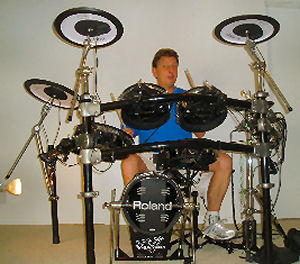
… and Dolph now.
What bands did you work with next?
After a brief sortie with a Virgin records act Cowboys International, I ‘semi-retired’ for about a year and did some traveling – a little mind cleansing and a little getting to know myself. I was still only 19. When I returned I joined up with a rather amusing pub outfit called Billy Karloff and The Extremes (See the video on YouTube). Billy was later to write Wait For The Blackout with the Damned. We toured with them but their audience did not find us to their preference and after a couple of unpleasant experiences we left the tour. Three days I think we lasted. I then depped on an American tour with Glen Matlock (Sex Pistols) for a few months.
How did the gig with Stiff Little Fingers come about and how was your time with them?
I knew the band from their time supporting TRB but hadn’t seen any of them for a while. A chance meeting of Glen Matlock and Jake Burns (SLF main-man) around the time Jim (Reilly) was leaving prompted a call inviting me to join Stiff Little Fingers. This outing lasted for about two years but was pretty fraught. The heady days of SLF’s Inflammable Material (SLF’s first and most successful album) had passed and the band and its audience were trying to come to terms with new ideas and directions. There seemed to be quite a ‘disconnect’ between the members including the manager and after Now Then (SLF’s 4th studio album) was critically panned I think the whole project just ran out of steam. Jake decided to call it a day, which was a shame because we had become good friends but it was without doubt the right thing to do.
My next gig was with a German superstar called Marius Muller-Westenhagen. He was a famous actor in his homeland and just happened to make albums on the side that would sell in excess of 1 million copies. The gigs were massive productions in huge cycle domes and hockey stadiums. Marius wanted the band to be like the Rolling Stones so he would regularly hand us – each – a bottle of Jack Daniels as we got on the tour bus in the morning. That band also contained the late great Paul Fox (The Ruts) and Ian Parker (TRB). We did two albums Das Herz eines Boxers and Geiler is” schon.
You then teamed up with Spear Of Destiny. How did that happen and how was your experience with them?
After leaving SLF – the first time – I became the ‘sometimes go to’ session drummer for Nick Tauber, the producer of SLF’s Now Then album. He was booked to produce Spear’s One Eyed Jacks. They had employed Hugo Burnham from Gang of Four but for some reason it didn’t work out and I stepped in to help the band out. I did 2 years and two albums with Spear but Kirk (Brandon, S.O.D main-man) got dropped from his record label and as was his way he dumped the band members, got a new deal and employed new guys.
It was without doubt musically the best outfit I ever played with, electrifying live with a potential hugely unfulfilled. Fans of the band at the time included Mick Jagger, Simon le Bon and Footballer Pat Nevin (Chelsea winger).
On the sessions for Nick Tauber and Rusty Egan were you using a click track and how did you get on with it. Ginger Baker said that he always played in ‘perfect time’ anyway so clicks never bothered him. How do you feel about them?
By now (1983/84) it was a necessity to play to a click track. It took a bit of practice but once I got used to it I felt comfortable to the point of enjoying it.
When we were doing the second TRB album Chris Thomas brought a primitive drum machine into the studio and suggested I play to it. He told me that Paul Thompson (Roxy Music) swore by it. I wasn’t too keen and told Chris to shove it. I wonder where he is now? [Chris Thomas is of course a hugely successful record producer]
With Spear, Rusty Egan had a Linn drum machine in the studio but Kirk didn’t believe in drum machines preferring the ‘keep it real’ style. Rusty put it in a black bin bag under the mixing desk and fed me the click.
Who were your drumming influences at this point? I hear a bit of Stewart Copeland in there, would that be right?
I saw Stuart playing at Brunel University with Curved Air in 1975 or ‘76 and thought he was magnificent! Subconsciously, yes, he probably was an influence. I saw the Police reunion tour at Dodgers Stadium this year but he seemed a bit all over the place that night: Bad day at the office I s’pose – we all have them. The only drummer that I can ever remember thinking “I want to be like him” was Keith Moon. They just wound him up and let him go.
So when the Stiff Little Fingers reformation happened in 1987 the pressure was somehow off?
We reformed ‘just for fun’. That was when we really started to enjoy it all again. As you know – having followed admirably in my seat – Jake is still doing it and therefore must still be having fun! I moved on in 1997 having done 10 years of the reformation, partly for family reasons, partly because I needed a new challenge. My marriage was in trouble and I wanted to find something that kept me off the road so Russell (Russell Emanuel. SLF manager 88-97) and I set up Extreme Music. The company succeeded . . . the marriage didn’t.
What are you doing now and where do you live?
I currently live in Los Angeles where I am co-CEO of Extreme Music. I set the company up together with Russell Emanuel in 1997. In 2005 we sold the company to Viacom and in 2007 they sold it on to Sony/ATV which makes Michael Jackson my current boss! Extreme’s writers and producers include Quincy Jones, Hans Zimmer, Snoop Dogg, Xzibit, Sasha & Digweed, guys from Poison, Whitesnake, Robbie Nevil (High School Musical) amongst many more. It’s a pretty diverse collection that covers contemporary stuff to classical to world music and services all media productions including films, trailers, TV shows and advertising.
I hope this doesn’t sound conceited but the nuances of probably very talented pop, rock and jazz drummers kind of pass me by nowadays. I listen to music 12 hours a day and my attention is drawn to styles that I’m not so familiar with
Who are your favourite players now?
I hope this doesn’t sound conceited but the nuances of probably very talented pop, rock and jazz drummers kind of pass me by nowadays. I listen to music 12 hours a day and my attention is drawn to styles that I’m not so familiar with. Latin percussion often played by indigenous but unknown locals inspire me as much as say a Neil Peart or a Vinnie Coliauta. I employ lots of drummers for our recordings and especially in the ‘film orchestral’ arena Frank Ricotti and Ryland Allison make the hairs stand up!
Every drummer has a nightmare ‘in-the-studio’ story: What’s yours?
My first recording with SLF, The One Pound 10 or Less EP! Tim Friese-Green producing. He made me sit there for three days getting a snare drum sound. Jake and the boys were getting pretty impatient in the poolroom and eventually Jake lost his temper. Not the best start with your new band.
I’ve got another story – not as a drummer but drummer related. In the early days of Extreme I had the privilege to work with the legendary Billy Cobham. The man was a real gent and he invited me down to the studio to hear stuff he was recording. I walked in during the recording of a track and the first thing I noticed was that after about 30 seconds of random rolls and ambient drum ‘faffing’ this killer bass-line thundered into the track. When they stopped Billy asked me what I thought so I said, “Hey Bill wouldn’t it be great to start the track out with just that bass-line.” There was about a 30 second silence while he chillingly stared at me. You could cut the air with a knife. He then sullenly turned to the bass player and barked, “Hey Laslo, come in 16 bars before I do”.
You were brave; he’s quite a formidable guy. What about an on-the-road nightmare story? Got one of those?
SLF had been booked to play a 500 seater in the Basque Country politically volatile area of Northern Spain. We were picked up and driven for about 90 mins up a mountain to the middle of nowhere. They drove us ‘into’ the venue. A gymnasium with a capacity of about 5000! Above the drum kit there was a banner, which, although we could not translate contained the acronyms, ETA and SLF – a tad worrying. While Jake was stamping his feet to the promoter Russell was busy telling him the band would not play unless they came up with considerably more cash. So there we are in the middle of nowhere at the mercy of a Basque terrorist organization and Russ and the four band members – we had no crew – are going to die. So Russ locks us in the dressing room and tells us not to move. What seemed hours went by and we were aware that there was a large baying crowd gathering in the gym. Eventually he bursts through the door, loads me with more pesetas than I had ever seen and proclaims, “Look after that, I’m off!”
We played the gig – a blinder – they took the banner down and when I came off stage I peeled the cash off my sweaty body. We rode back to town with some trepidation only to find Russ sitting in the Hotel Bar. I still don’t know how we got out alive.
I know you haven’t played drums much in the last few years mate but when are we going to see you behind a kit again?
I played on much of Extreme’s early material but as the business grew my attention was more and more required elsewhere. We used to throw the odd party for our clients and invite some ‘All Star’ guests to play with us but it just sort of fizzled out.
However just recently Russell came into my office and asked me if I had a traps case floating around. He needed to convert his den into a bedroom for his son and had to put his V-Drums, complete with DW hardware and $500 drum throne – he never buy’s rubbish – into storage. “I’ll be looking after those,” I said.
So like a kid at Christmas I rushed home and set them up. For a while I just kinda looked at them. Eventually I plucked up the courage, plugged the old iPod into the mix-in and called up a preset. I thought long and hard about which song to play to and after some deliberation settled on Should I Stay Or Should I Go (The Clash). That sounds appropriate I thought. Anyway, I laid into that kit like a man who hadn’t had sex for ten years! It was brilliant! Of course probably not as brilliant for my wife who not only had to listen to me thrashing about like an octopus in not enough water but then had to endure the endless dull on-the-road stories as I regaled in how good I could still be.
It’s been a few weeks now and I play everyday. I’d like to say I’m improving but the rim shot bruise on my inner thigh and skin falling off my hands like they’ve been exposed to napalm are slightly hampering my progress. However, I am of the belief that with a bit of practice, if all else fails, I could probably go back to the old day job.
Fortunately the position I’m in means I can book pretty much any musician I like, and I hope to be able to give myself the call sometime next year. Extreme have a project called Scoregasm which is effectively all action trailer music performed by a 90 piece orchestra and an 80 piece choir. If I’m match fit by then, I’ll do it – always good to have something to aim for.
Great to hear you’re back playing again. Good luck with it and thanks for your time.
Thanks for giving me this opportunity to reminisce and for helping rekindle my interest in the drums. Thanks for looking after my old mate Jake and helping keep the SLF brand alive.


